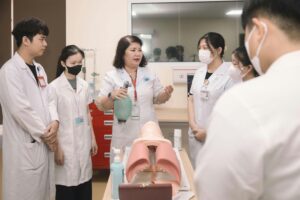No matter if you have just started your medical school journey or are about to complete your final year, choosing a medical specialty and your career plans that best match you are quite challenging. Some students make their minds before entering medical school. While others choose the residency program during the four years of schooling
Choosing the medical residency program is one of the most important decisions for medical students. Whether you choose hematology, neurology, endocrinology, plastic surgery, or any other medical specialty. Matching with a perfect residency match is a huge accomplishment.
Matching to competitive residency programs is no easy feat. Certain factors such as your personal interests, salary prospects, work-life balance, and courses you will take, should be kept in mind during the selection process. Some residency programs are easier to get into, while some are competitive and require impressive grades and USMLE scores.
If you are struggling hard to choose the right medical specialty, it is advised to keep your career goals and interests in mind. Here I have discussed the most competitive residencies in 2022 to help you decide which medical specialty to apply for matching.
Let’s explore top 10 medical residencies in 2022 -2023.
What are the Most Competitive Residencies?
- Plastic Surgery
- Dermatology
- Neurosurgery
- Orthopedic Surgery
- ENT/Otolaryngology
- Interventional Radiology
- Vascular surgery
- Thoracic surgery
- Radiation Oncology
- Internal Medicine – Pediatrics
Top 10 Competitive Medical Residencies
-
Plastic Surgery
Match Rate: 91.7%
It is one of the most competitive medical residencies that provides many positions for the future residents. Though plastic surgery is a new medical field compared to other fields, it is still the most competitive specialty as it offers many diverse opportunities. Plastic surgery is a highly advanced medical field that offers a 6-years training program. It involves complex surgeries such as cosmetic surgery and reconstructive surgery.
Plastic surgeons deal with repair, reconstruction, and replacement of defects of skin, musculoskeletal system, hand, breast, hand, and other extremities. Plastic surgeons used highly advanced cosmetic surgical tools to perform reconstructive procedures to improve overall appearance.
-
Dermatology
Match Rate: 81%
Dermatology is one of the top medical specialties but has a comparatively lower ranking for match rate than plastic surgery. It involves four years of training to become a dermatologist and offer lucrative career options. As a dermatologist, you are responsible for treating hundreds of conditions related to the skin, hair, and nails. From eczema to psoriasis, alopecia, allergic reactions, infections and skin cancer, dermatologists are responsible for treating complex diseases.
-
Neurosurgery
Match Rate: 87.5%
Neurosurgery is a highly advanced medical residency program that ranks high due to its most competitive neurological positions and higher salary prospects. It takes five to seven years to complete a neurosurgery residency program and specialize in a particular area. You will find a number of specialized fields to choose from such as spinal surgery, epilepsy surgery, cerebral vascular surgery, pediatric neurosurgery, etc.
Neurosurgeons have in-depth knowledge of the brain, central nervous system, peripheral nervous system, and spine, and treat a variety of complex neurological conditions. From carpal tunnel syndrome to cerebrospinal fluid, herniated discs and sciatica, neurosurgeons get the chance to provide medical advice and surgical treatment.
-
Orthopedic Surgery
Match Rate: 80.8%
Orthopedic surgery is one of the hardest medical residencies to match. It offers highly advanced career opportunities and salary prospects. It takes five years to complete the orthopedic neurosurgery residency training program. The field of orthopedic surgery focuses on the musculoskeletal system which involves tendons, ligaments, muscles, and joints. Orthopedic surgeons can perform foot and ankle surgery, hand surgery, spine surgery, shoulder and elbow surgery and trauma surgery – to name a few.
-
ENT/ Otolaryngology
Match Rate: 88.6%
Otolaryngology or ENT specialty is the oldest medical field that has been considered as a competitive residency for a number of years. To become an otolaryngologist, you need to complete a 5-year residency program. The medical specialty is solely focused on the ears, nose, and throat. It is a surgical specialty that involves surgeries of vocal cords, larynx, sinuses, thyroids and parathyroids. Otolaryngologists are trained to use different advanced techniques and procedures to deal with complex issues related to the head and neck.
-
Interventional Radiology
Match Rate: 81.3%
Interventional radiology is an interesting medical field that trains students to diagnose complex medical conditions by using diagnostic procedures such as CT scans, MRI scans, X-rays, ultrasounds and more. It is a five-year residency training program that primarily focuses on diagnostic radiology during the first three years and the remaining two years of curriculum is focused on interventional radiology. The residency program also prepares senior medical students to perform diagnostic radiology procedures, provide pre-operative and post-operative care, and pursue IR-related research roles.
-
Vascular Surgery
Match Rate: 81.3%
Vascular surgery is an interesting medical specialty that is designed to provide residents with in-depth training in interventional procedures, endovascular surgery, inpatient and outpatient care. Vascular surgery is a 2-year training program, students have to complete 4-5 years of general surgery training. Residents will learn how to treat and manage disorders related to arterial, venous, and lymphatic system. Senior MD students will learn how to treat different vascular diseases, perform vascular surgeries and endovascular techniques.
-
Thoracic and Cardiac Surgery
Match Rate: 84.2%
Thoracic and cardiac surgery is a complex medical specialty that involves operative, perioperative care, and specialized surgical critical care. The specialty also deals with congenital pathologic conditions, injuries related to the chest, esophagus, trachea, pleura, mediastinum, diaphragm, pericardium, heart, and lungs. Thoracic residency program requires six to eight years of specialized training.
-
Radiation Oncology
Match Rate: 78.6%
Radiation oncology is another competitive medical residency program that is commonly associated with cancer treatment. It is a highly specialized field of clinical medicine that involves radiation therapy to control and kill malignant and benign cells. Radiation oncologists are responsible to perform CT scans, MRI scans, ultrasounds, to treat lung, breast, prostate, cervix, uterus, and brain cancers. Radiation oncologists have to complete a 4-year residency training program and 1 transitional year, i.e. five years of postgraduate education.
-
Internal Medicine – Pediatrics Meds/Peds
Match Rate: 81%
Meds/Peds also called Internal Medicine and Pediatrics is a 4-year residency program that provides training in internal medicine and pediatrics both. The Med-Ped residency program is mainly focused on primary care training. Med-peds residents can treat patients of all ages – newborn to geriatric patients. Completing a Med-Ped residency program will provide career opportunities in a variety of settings such as hospitals, education, research, administration, and public health.
Concluding Note
Matching to competitive residency programs will become easier if you start preparing early and show your interest in the particular medical specialty. To get a perfect residency match, you need to get impressive USMLE scores and GPA, research, and clinical skills, and show your commitment to that particular medical specialty.







